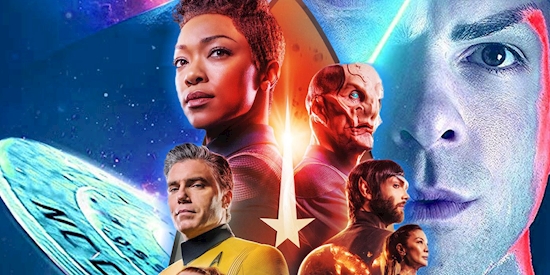Star Trek: Discovery References Kelvin Timeline Events
WARNING: The following contains spoilers for Star Trek: Discovery Season 3, Episode 7, "Unification III," now streaming on CBS All Access.
In 2009, J.J. Abrams' Star Trek film rebooted the franchise by offering a new beginning that took place in a different timeline. Instead of undoing everything that had come before, the film broke off from the Prime Universe, which allowed it and its two sequels to forge their own path. Therefore, this alternate timeline, popularly known as the Kelvin Timeline, is still canon to the Prime Universe, even though it is rarely acknowledged in other Star Trek entries.
Click the button below to start this article in quick view. Start nowHowever, the latest episode of Star Trek: Discovery makes a reference to the Kelvin Timeline, showing that even though it's been years since Abrams' last film, it is still home to an important storyline involving one of the franchise's biggest characters: Spock.
In "Unification III," Michael Burnham travels to the planet Ni'Var, formerly known as Vulcan. There, she presents her scientific findings about the Burn to a tribunal of Vulcans and Romulans in the hopes they will in turn share their own data. The process isn't without its challenges, and talk inevitably turns to Ambassador Spock, Michael's brother. In Season 2 of Discovery, Michael spent a great deal of time alongside Spock. However, now that she is in the 32nd century, her brother has long since passed, and she learns of his efforts as an Ambassador to unify the Romulans and the Vulcans during the era of Star Trek: The Next Generation.
The tribunal questions Michael's attachment to the Federation, as well as Spock's, considering he too ultimately left it behind. Michael responds that Spock would have surely continued to operate in the Federation's interests, had he ever returned.
This is indeed a reference to the Kelvin Timeline. In the 2009 Star Trek film, Spock accidentally traveled back in time through a wormhole along with the evil Romulan Nero. Their arrival created the alternate timeline, and although Nero was defeated in the film, Spock chose to remain behind to help rebuild Vulcan society after the planet's destruction. Ambassador Spock would briefly return in the sequel, 2013's Star Trek Into Darkness, and news of his death would be communicated in the third film, 2016's Star Trek Beyond.
Spock is an important character in the Prime Universe, but after his departure, he never returned. It's unclear how much Burnham and the Vulcans know about what happened to him. Do they know he was in an alternate timeline, or about his continued efforts to save his people? Spock may not have come back, but Burnham was right: he did continue to help the Federation, even if he was in a different version of reality.
Streaming on CBS All Access, Star Trek: Discovery stars Sonequa Martin-Green as Commander Michael Burnham, Doug Jones as Commander Saru, Anthony Rapp as Lt. Commander Paul Stamets, Mary Wiseman as Ensign Sylvia Tilly, Wilson Cruz as Dr. Hugh Culber, David Ajala as Cleveland "Book" Booker, Blu del Barrio as Adira, Ian Alexander as Gray, Tig Notaro as Chief Engineer Reno and Michelle Yeoh as Philippa Georgiou. New episodes of Season 3 air on Thursdays.
About The AuthorSource: www.cbr.com

